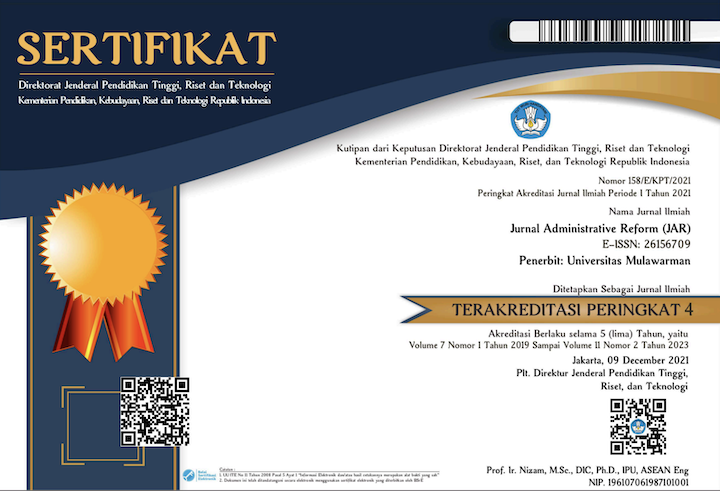ANALISIS IMPLEMENTASI KEBIJAKAN IDENTITAS KEPENDUDUKAN DIGITAL PERSPEKTIF TEORI PILIHAN PUBLIK DI KUTAI KARTANEGARA
Abstract
Keywords
Full Text:
PDFReferences
Baba, M. A. (2017). Analisis Data Penelitian Kualitatif. Makassar: Penerbit Aksara Timur.
Disdukcapil.kukarkab.go.id, 2020. https://disdukcapil.kukarkab.go.id/ Diakses pada 5 Maret 2024.
Junaidi, S., Rahmat, M., & Latif, A. (2022). Karakteristik Pemilih Di Kabupaten Sidenreng Rappang Pada Pemilihan Legislatif Dalam Perspektif Teori Pilihan Publik. PRAJA: Jurnal Ilmiah Pemerintahan, 10(2), 100-106.
Kompas.com, 22 Juli 2023, Mengenal Identitas Kependudukan Digital atau KTP Digital dan Cara Membuatnya. Di akses pada 13 September 2023 https://tekno.kompas.com/read/2023/07/22/14450027/mengenal-identitas-kependudukan-digital-atau-ktp-digital-dan-cara-membuatnya
Kompas.com, 15 Desember 2023, 5 Perbedaan E-KTP dan IKD, Warga Tak Repot Lagi Fotocopy. Diakses pada 18 Desember 2023. 5 Perbedaan E-KTP dan IKD, Warga Tak Repot Lagi Fotocopy.
Nurany, F., Rahmadhani, C. D., Kurniawati, L., Sharmistha, P., Mahendra, Y. I., & Sary, I. R. (2021). Implementasi Dalam Pelaksanaan E-KTP. Universitas Bhayangkara Surabaya, Vol.3 No. 1 2021, 22–29. https://ppjp.ulm.ac.id/journals/index.php/jpp.
Panagiotis Karadimas. (2023). Public Choice Theory: An Explanation of the Pandemic Policy Responses.
Peraturan Menteri Dalam Negeri Republik Indonesia Nomor 72 Tahun 2022 Tentang Standar dan Spesifikasi Perangkat Keras, Perangkat Lunak, dan Blangko Kartu Tanda Penduduk Elektronik Serta Penyelenggaraan Identitas Kependudukan Digital.
Peraturan Menteri Dalam Negeri Nomor 6 Tahun 2011 tentang Perubahan atas Peraturan Menteri Dalam Negeri Nomor 38 Tahun 2009 tentang Standar dan Spesifikasi Perangkat Keras, Perangkat Lunak, dan Blangko Kartu Tanda Penduduk Berbasis Nomor Induk Kependudukan Secara Nasional.
Peter T. Lesson, H. A. T. (2021). Public choice and Public health. George Mason University.
Putera, R. E., & Valentina, T. R. (2011). Implementasi Program KTP Elektronik (e-KTP) di Daerah Percontohan. Universitas Andalas, Vol. XXVII, No. 2 (Desember 2011): 193-201(2).
Sugiyono. (2016). Metode Penelitian Kuantitatif, Kualitatif dan R&D. Bandung: Alfabeta.
Wawan Kuswandoro. (2015). Inovasi Pelayanan Publik: Citizen Charter (Contoh Pelayanan Publik Berintegritas).
http://wkwk.lecture.ub.ac.id/2015/10/inovasi-pelayanan-publik-citizen-charter-contoh-pelayanan-publik-berintegritas/
DOI: http://dx.doi.org/10.30872/jar.v12i2.16811
Refbacks
- There are currently no refbacks.
Copyright (c) 2025 Jurnal Administrative Reform

This work is licensed under a Creative Commons Attribution-NonCommercial-ShareAlike 4.0 International License.
Jurnal Administrative Reform (JAR)
pISSN: 2337-7542 | eISSN: 2615-6709
Organized and Published by Magister Administrasi Publik - Fakultas Ilmu Sosial dan Ilmu Politik, Universitas Mulawarman
W : http://e-journals.unmul.ac.id/index.php/JAR/
E : jurnal.adm.reform@unmul.ac.id

Jurnal Administrative Reform (JAR) is licensed under a Creative Commons Attribution-ShareAlike 4.0 International License.




